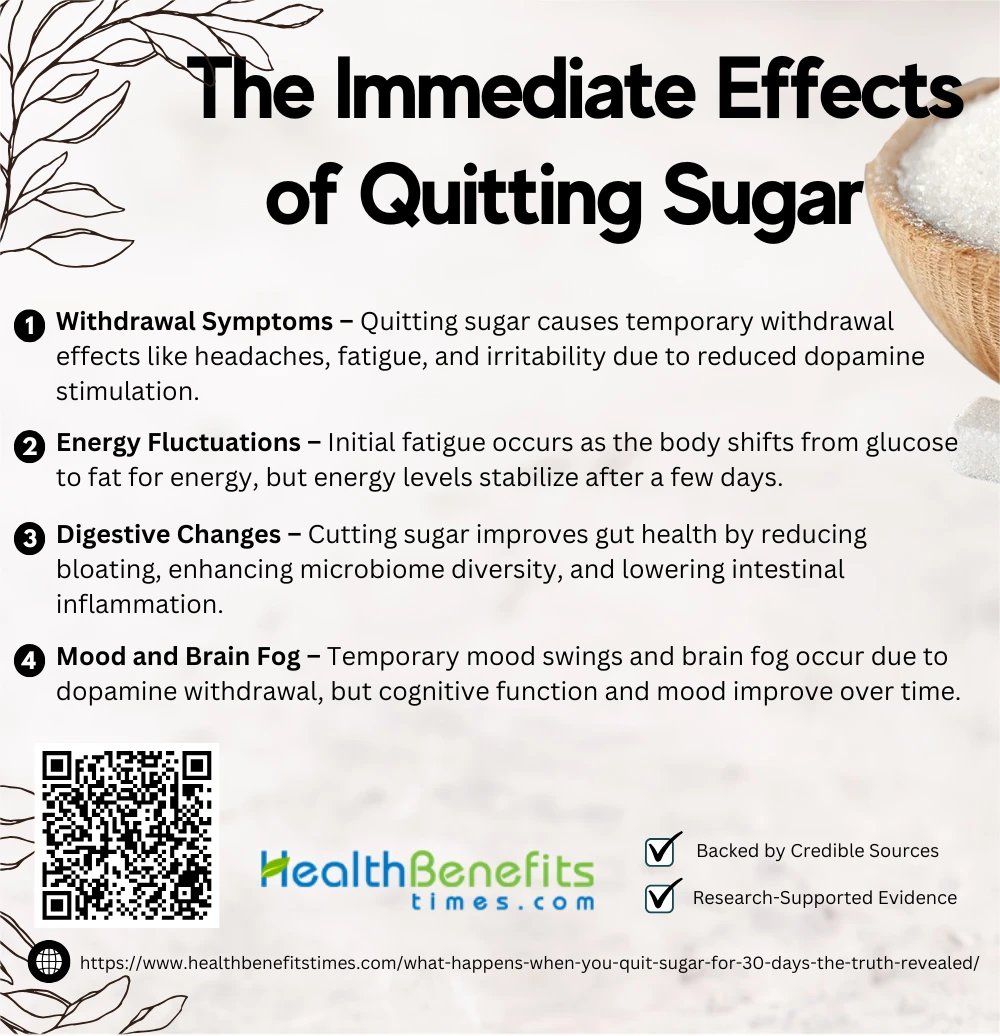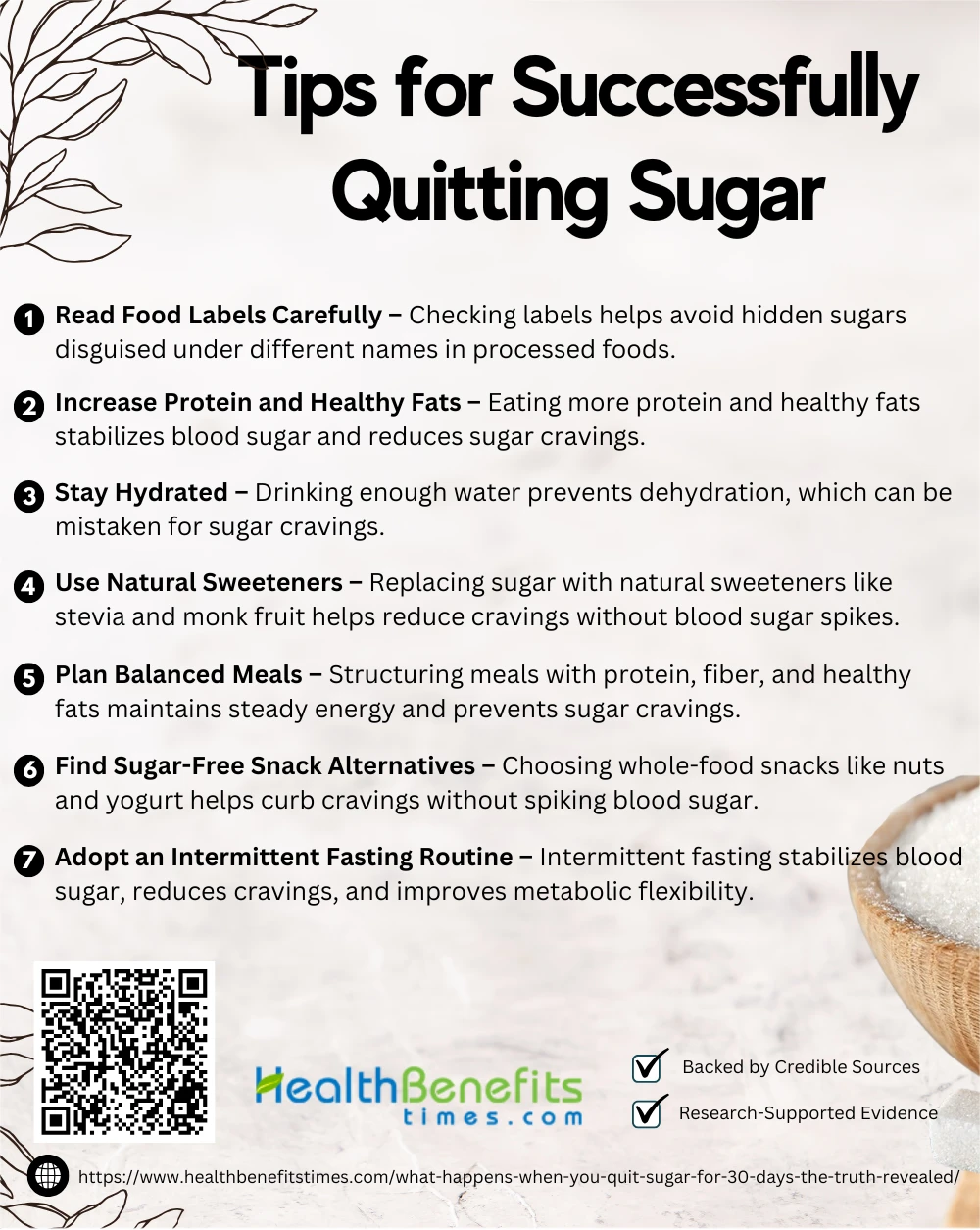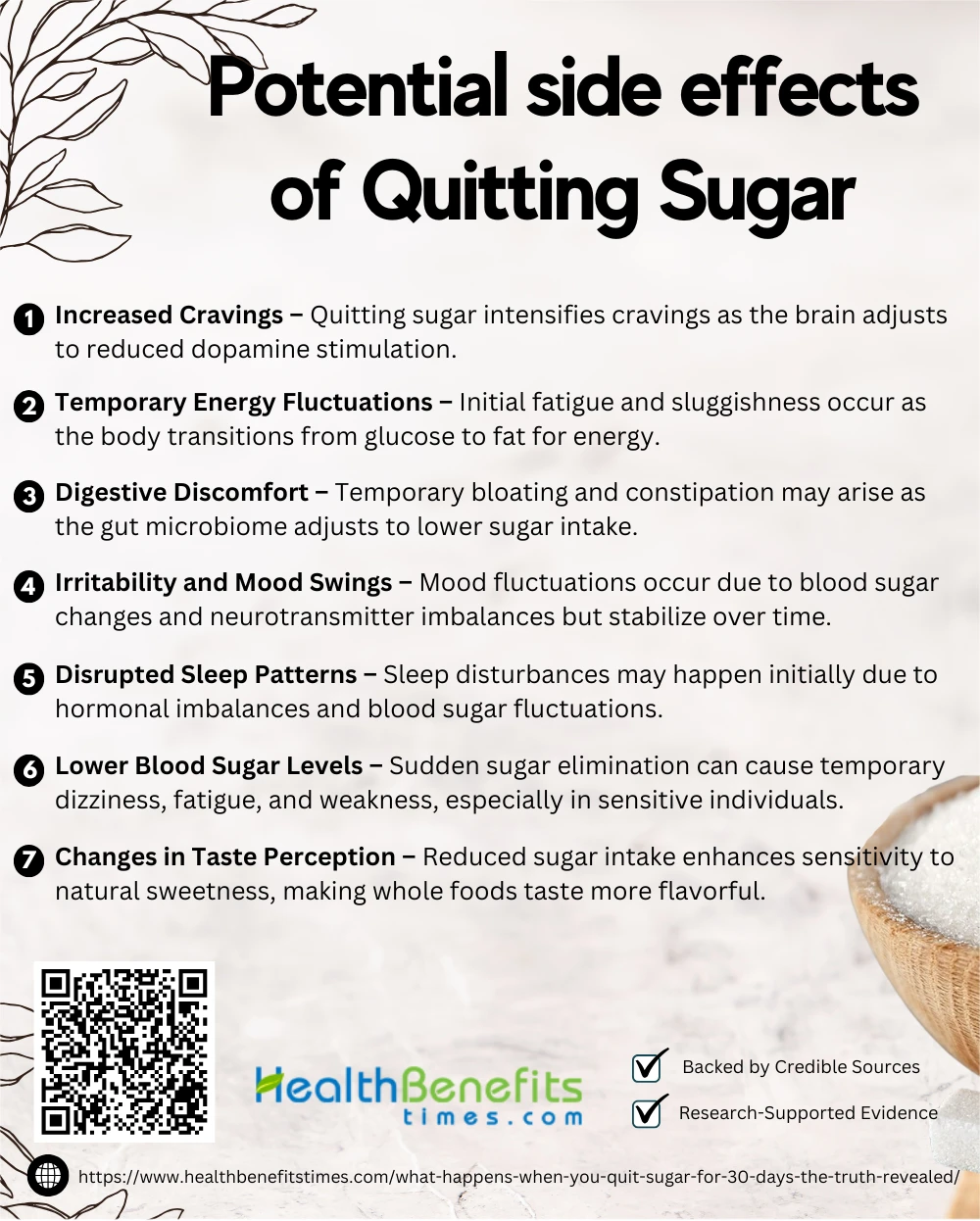- It means eliminating added sugars from your diet, including sugary drinks, desserts, and processed foods, for 30 days.
- Expect improvements in energy levels, reduced cravings, and better mental clarity as your body adjusts to a lower sugar intake.
- While quitting sugar can lead to weight loss, better digestion, and balanced blood sugar, initial withdrawal symptoms like headaches and fatigue are common.
 Quitting sugar refers to eliminating added sugars from the diet, including refined sugars and high-fructose corn syrup, which are commonly found in processed foods and beverages. Studies suggest that reducing sugar intake can significantly improve metabolic health and reduce the risk of chronic diseases.
Quitting sugar refers to eliminating added sugars from the diet, including refined sugars and high-fructose corn syrup, which are commonly found in processed foods and beverages. Studies suggest that reducing sugar intake can significantly improve metabolic health and reduce the risk of chronic diseases.
In today’s world, sugar is everywhere—from breakfast cereals to energy drinks—making it a significant contributor to various health concerns. Research indicates that high sugar consumption is linked to obesity, type 2 diabetes, cardiovascular disease, and even cognitive decline. But what happens when you completely remove sugar from your diet for 30 days? Studies have shown that within just a few days of quitting sugar, individuals experience withdrawal-like symptoms, including headaches, mood swings, and fatigue, as their body adjusts to the absence of high-glycemic spikes. However, by the second week, the body begins stabilizing, leading to improvements in energy levels, mood regulation, and reduced inflammation. Research further suggests that a month-long sugar detox can enhance cognitive function and metabolic flexibility, improving insulin sensitivity and gut microbiome health. Additionally, quitting sugar has been linked to reduced risks of metabolic syndrome and lower triglyceride levels, which contribute to better heart health.
The benefits of quitting sugar extend beyond physical health. Some studies suggest that a sugar-free diet can lead to a significant improvement in mental clarity and reduced symptoms of anxiety and depression. Moreover, avoiding sugar for 30 days can reset taste buds, making natural foods taste sweeter and reducing future cravings for highly processed foods. However, experts warn that completely eliminating sugar without proper dietary planning may lead to nutrient deficiencies, emphasizing the importance of replacing refined sugars with nutrient-dense whole foods.
Understanding Sugar’s Impact on the Body
Sugar plays a crucial role in the body by serving as a primary energy source, fueling the brain and muscles during daily activities. However, excessive sugar consumption has been linked to serious health issues, including insulin resistance, obesity, and cardiovascular diseases. High sugar intake also contributes to chronic inflammation and negatively affects gut health. Research highlights that limiting sugar can improve metabolic function and reduce disease risk.
The Immediate Effects of Quitting Sugar
In the first week of quitting sugar, your body undergoes significant adjustments. You may experience withdrawal symptoms like headaches, cravings, and fatigue as your system detoxes and stabilizes blood sugar levels.
1. Withdrawal Symptoms
Quitting sugar triggers withdrawal symptoms such as headaches, fatigue, irritability, and mood swings as the brain adjusts to reduced dopamine stimulation. Studies suggest that these symptoms mimic drug withdrawal due to sugar’s addictive properties. (1) Additionally, sudden sugar elimination can cause temporary energy crashes and difficulty concentrating as the body adapts to using alternative energy sources. (2)
2. Energy Fluctuations
Quitting sugar initially leads to fatigue and sluggishness as the body transitions from glucose to fat for energy. Studies indicate that this phase is temporary, with energy levels stabilizing after a few days. Additionally, research shows that eliminating sugar reduces glycemic fluctuations, leading to more consistent energy throughout the day. (3)
3. Digestive Changes
Eliminating sugar positively impacts gut health by reducing bloating and promoting beneficial gut bacteria growth. Research suggests that lower sugar intake improves gut microbiome diversity and digestive function. ({% trusted %}) Furthermore, studies highlight that cutting sugar reduces intestinal inflammation, leading to fewer gastrointestinal issues such as gas and discomfort. (4)
4. Mood and Brain Fog
Quitting sugar can initially cause mood swings and brain fog due to dopamine withdrawal, leading to irritability and difficulty concentrating. Studies suggest that these symptoms are temporary, with cognitive function improving as blood sugar stabilizes. (5) Additionally, research highlights that reducing sugar consumption decreases inflammation and enhances neurotransmitter balance, ultimately boosting mental clarity and mood stability. (6)
What Happens When You Quit Sugar for 30 Days? The Truth Revealed!
Quitting sugar for 30 days can transform your body and mind. From initial withdrawal symptoms to increased energy, clearer skin, and better focus, discover the real effects of cutting out sugar completely.
1. Better Sleep Patterns
Eliminating sugar for 30 days can significantly improve sleep quality by stabilizing blood sugar levels, reducing nighttime awakenings, and enhancing melatonin production (Rubin, 2015). Studies show that high sugar intake is linked to poor sleep efficiency and increased restlessness (Yu, 2019). Removing sugar helps regulate cortisol levels, reducing stress and promoting deeper sleep (Elia, 2021). Research further suggests that low sugar diets enhance slow-wave sleep, crucial for memory consolidation. (7) Additionally, diets rich in whole foods and low in added sugars are associated with fewer sleep disturbances. (8)
2. Weight Loss Begins
A 30-day sugar detox can contribute to weight loss by reducing calorie intake, lowering insulin spikes, and promoting fat metabolism. (9) Cutting added sugars leads to decreased water retention and bloating, resulting in early weight loss benefits. (10) Research highlights that removing sugar reduces cravings for processed foods, leading to healthier eating habits. (11) Furthermore, low-sugar diets improve metabolic flexibility, enabling the body to burn fat more efficiently. (12) Studies also indicate that individuals experience a drop in overall body fat percentage after a month of eliminating refined sugars. (13)
3. More Stable Energy Levels
Eliminating sugar for 30 days can lead to more sustained energy levels by preventing blood sugar spikes and crashes. Studies suggest that reducing sugar improves metabolic efficiency and insulin sensitivity, leading to steadier energy throughout the day. (14) Additionally, research highlights that diets low in added sugars enhance mitochondrial function, the powerhouse of cells responsible for energy production. (15) Furthermore, consuming whole foods instead of sugar-laden products provides long-lasting energy without the rapid depletion associated with high glycemic foods. (16) Moreover, quitting sugar promotes better sleep, which contributes to improved energy levels and overall well-being. (17)
4. Clearer Skin
Quitting sugar for 30 days can significantly enhance skin health by reducing inflammation and glycation, which contribute to premature aging and acne. Research shows that sugar reduction minimizes insulin spikes that trigger oil production and breakouts. A 4-week gut-focused sugar detox program has been linked to clearer skin and reduced signs of aging. Additionally, cutting refined sugars can improve skin hydration and elasticity. (18) Studies also indicate that people experience better sleep, increased energy, and healthier skin after quitting sugar for a month.
5. Better Digestive Health
Removing sugar from the diet for 30 days can significantly improve gut health by reducing harmful bacteria and promoting beneficial microbiome diversity. Studies indicate that excessive sugar consumption disrupts gut flora and increases inflammation, leading to digestive issues. (19) Cutting sugar has been shown to reduce bloating and improve nutrient absorption, which enhances digestive efficiency. (20) Research also highlights that a sugar-free diet can accelerate gut motility, reducing constipation and promoting regular bowel movements. (21) Additionally, eliminating added sugars decreases gut inflammation and improves intestinal barrier function. (22) Finally, diets rich in fiber and low in refined sugar have been linked to improved digestion and reduced symptoms of irritable bowel syndrome (IBS). (23)
6. Improved Mental Clarity and Mood
Eliminating sugar for 30 days can enhance cognitive function and emotional stability by reducing inflammation and balancing neurotransmitter levels. Studies suggest that high sugar intake contributes to brain fog and mood disorders by disrupting insulin signaling in the brain. Research also indicates that reducing sugar intake decreases symptoms of anxiety and depression, leading to improved mental well-being. (24) Furthermore, dietary improvements, including cutting sugar, have been linked to enhanced focus, memory retention, and mental performance. (25) Additionally, quitting sugar promotes long-term mental resilience by reducing oxidative stress and inflammation in the brain. (26)
7. Stronger immune system and reduced inflammation
Eliminating sugar for 30 days strengthens the immune system by reducing chronic inflammation and improving gut health. Research indicates that excess sugar consumption suppresses immune function and increases inflammatory markers, making the body more vulnerable to infections. (27) Cutting sugar enhances T-cell response, crucial for fighting infections and maintaining overall immunity. (28) Additionally, a sugar-free diet lowers oxidative stress, a key driver of inflammation-related diseases. (29) Reducing added sugar intake also supports a balanced gut microbiome, which plays a vital role in regulating immune responses. (30) Lastly, anti-inflammatory diets low in sugar have been linked to improved immune defense mechanisms and better overall health. (31)
8. Reduced Risk of Chronic Diseases
Reducing sugar intake for 30 days significantly decreases the risk of chronic diseases by stabilizing blood glucose levels, lowering insulin resistance, and reducing obesity-related complications. Studies show that eliminating added sugars helps prevent type 2 diabetes by improving glucose metabolism and insulin sensitivity. (32) Additionally, research indicates that a low-sugar diet reduces inflammation, a key driver of cardiovascular disease and metabolic disorders. (33) Furthermore, reducing sugar consumption helps maintain a healthy gut microbiome, which plays a role in preventing autoimmune and inflammatory diseases. (30) Lastly, studies highlight that cutting back on sugar intake is linked to a lower risk of hypertension and stroke due to improved vascular function. (29)
9. Dental Health Boost
Eliminating sugar for 30 days significantly reduces the risk of tooth decay and gum disease by limiting bacterial growth in the mouth. Research indicates that sugar consumption promotes plaque formation and acid production, leading to enamel erosion and cavities. (21) Studies show that cutting sugar improves saliva production, which naturally protects teeth from harmful bacteria. (34) Additionally, a sugar-free diet decreases gum inflammation, lowering the risk of periodontal disease. (35) Research suggests that individuals who quit sugar experience fresher breath due to reduced bacterial activity. (36) Lastly, eliminating sugar lowers the frequency of acid attacks in the mouth, leading to stronger and healthier teeth. (37)
10. Taste Bud Reset
Quitting sugar for 30 days helps reset taste buds, making natural foods taste sweeter and more flavorful. Research shows that high sugar intake dulls taste sensitivity, reducing the ability to detect subtle flavors. (38) Studies suggest that individuals who eliminate sugar experience a greater sensitivity to bitter and sour flavors as their palate adjusts. (39) Moreover, a sugar detox has been linked to a more balanced and diverse flavor perception, leading to healthier eating habits. (40) Finally, research indicates that quitting sugar reduces the craving for overly sweet foods, making it easier to maintain a healthy diet long-term. (41)
11. Improved metabolic health
Eliminating sugar for 30 days can significantly enhance metabolic health by improving insulin sensitivity, reducing inflammation, and promoting better energy regulation. Studies show that high sugar consumption contributes to metabolic disorders, including obesity and type 2 diabetes. (42) Cutting sugar lowers fasting blood glucose levels and stabilizes metabolic processes. (21) Research highlights that reducing sugar intake decreases visceral fat accumulation, reducing the risk of metabolic syndrome. (43) Additionally, sugar elimination has been linked to improved liver function and decreased fatty liver disease risk. Lastly, quitting sugar supports a balanced gut microbiome, which plays a crucial role in maintaining metabolic health. (44)
Tips for Successfully Quitting Sugar
Quitting sugar can be challenging, but the right strategies make it easier. Learn how to manage cravings, choose healthy alternatives, and stay committed to a low-sugar lifestyle for lasting benefits.
1. Read Food Labels Carefully
Reading food labels is essential to avoid hidden sugars that are commonly found in processed foods. Many products disguise sugar under names like high-fructose corn syrup, dextrose, and maltose. Studies show that checking ingredient lists and nutrition facts helps reduce sugar consumption and improve diet quality. Research highlights that misleading labels, such as “natural” or “fruit sugar,” can lead consumers to underestimate sugar content.
2. Increase Protein and Healthy Fats
Increasing protein and healthy fats can stabilize blood sugar levels and reduce cravings, making it easier to quit sugar. Research indicates that proteins support satiety and regulate appetite hormones, reducing the urge for sugary snacks. Additionally, consuming healthy fats like avocados, nuts, and olive oil helps maintain steady energy levels and prevent sugar crashes.
3. Stay Hydrated
Staying hydrated is crucial when quitting sugar, as dehydration can sometimes be mistaken for sugar cravings. Research suggests that drinking enough water helps regulate appetite and prevent energy crashes associated with sugar withdrawal. Additionally, proper hydration supports metabolic functions and aids in detoxification, making the transition away from sugar smoother.
4. Use Natural Sweeteners
Replacing refined sugar with natural sweeteners can help reduce cravings while maintaining a sweet taste in foods. Research indicates that alternatives like stevia and monk fruit do not spike blood sugar levels, making them suitable replacements. (45) Additionally, studies highlight that using natural sweeteners can support gut health and reduce inflammation compared to processed sugars. (46)
5. Plan Balanced Meals
Planning balanced meals is essential for maintaining steady energy levels and reducing sugar cravings. Research suggests that meals rich in protein, fiber, and healthy fats help regulate blood sugar and prevent overeating. (47) Additionally, studies highlight that a well-structured diet, incorporating whole foods and avoiding processed sugars, can support metabolic health and sustain long-term dietary changes. (48)
6. Find Sugar-Free Snack Alternatives
Finding sugar-free snack alternatives helps curb cravings and sustain energy without blood sugar spikes. Research indicates that options like nuts, seeds, yogurt, and dark chocolate can provide satisfying alternatives to sugary snacks. Additionally, studies show that selecting whole-food-based snacks instead of artificial sugar substitutes can improve gut health and satiety. ({% https://eprints.bournemouth.ac.uk/40762/ trusted %})
7. Adopt an Intermittent Fasting Routine
Intermittent fasting can help regulate blood sugar levels, reduce cravings, and improve metabolic flexibility, making it easier to quit sugar. Research suggests that fasting enhances insulin sensitivity, preventing energy crashes and stabilizing appetite. Additionally, studies highlight that intermittent fasting encourages fat adaptation, reducing reliance on sugar for quick energy boosts. (49)
Who should be cautious when quitting sugar?
Individuals with certain health conditions should be cautious when quitting sugar, as sudden reductions may lead to unintended metabolic effects. People with diabetes need to monitor blood sugar levels carefully since abrupt sugar elimination can cause hypoglycemia. (50) Pregnant women should also be mindful, as sugar plays a role in fetal development and energy balance. (51) Additionally, athletes and highly active individuals may need to adjust their carbohydrate intake to maintain energy levels. (52) People with a history of eating disorders should approach quitting sugar with caution, as it may trigger restrictive behaviors. (53) Lastly, individuals on certain medications affecting blood sugar levels should consult their healthcare provider before drastically reducing sugar intake. (54)
Potential side effects of Quitting Sugar
Quitting sugar isn’t always smooth—your body may react with withdrawal symptoms like headaches, mood swings, fatigue, and cravings. Understanding these potential side effects can help you navigate the transition successfully.
1. Increased Cravings
Quitting sugar can lead to increased cravings as the brain adjusts to reduced dopamine stimulation. Research suggests that sugar activates reward pathways, similar to addictive substances, leading to intensified cravings during withdrawal. (55) Additionally, studies highlight that individuals who cut sugar abruptly may experience strong urges for carbohydrate-rich foods due to changes in blood glucose regulation.
2. Temporary Energy Fluctuations
Temporary energy fluctuations are common when quitting sugar as the body transitions from quick glucose spikes to fat metabolism. Research indicates that this period of adjustment can cause fatigue and sluggishness due to changes in glycogen storage and utilization. (56) Furthermore, studies suggest that metabolic flexibility improves over time, leading to more stable energy levels as the body adapts to alternative fuel sources.
3. Digestive Discomfort
Quitting sugar can temporarily cause digestive discomfort, including bloating and constipation, as the gut microbiome adjusts. Research suggests that changes in gut flora due to sugar withdrawal may initially disrupt digestion and motility. (57) Additionally, studies highlight that reducing sugar intake can alter gut microbiota composition, leading to temporary gastrointestinal distress before long-term gut health improvements occur. (58)
4. Irritability and Mood Swings
Eliminating sugar can initially cause irritability and mood swings due to blood sugar fluctuations and neurotransmitter imbalances. Research suggests that sugar impacts serotonin and dopamine levels, leading to withdrawal-like symptoms when intake is reduced. (59) Additionally, studies show that sudden sugar restriction can increase anxiety and agitation, but these effects typically subside as the body adapts to stable energy sources.
5. Disrupted Sleep Patterns
Quitting sugar can initially disrupt sleep patterns due to fluctuations in blood sugar levels and hormonal imbalances. Research suggests that reducing sugar intake affects melatonin production, which influences sleep quality and circadian rhythms. (60) Additionally, studies indicate that sugar withdrawal can cause restlessness and difficulty falling asleep due to reduced serotonin availability. (61)
6. Lower Blood Sugar Levels
Abruptly cutting sugar can lead to lower blood sugar levels, potentially causing dizziness, fatigue, and weakness. Research highlights that sudden sugar elimination can cause hypoglycemia, especially in individuals with insulin sensitivity issues. (62) Additionally, studies suggest that individuals prone to blood sugar fluctuations should transition gradually to avoid metabolic disturbances.
7. Changes in Taste Perception
Quitting sugar can temporarily alter taste perception, making previously unsweetened foods taste more intense. Research suggests that the absence of sugar enhances sensitivity to natural sweetness, leading to an improved appreciation for whole foods. (63) Additionally, studies indicate that reduced sugar intake can rewire taste receptors, decreasing cravings for overly sweetened foods and promoting healthier eating habits. (64)
Conclusion
Quitting sugar for 30 days can be a transformative experience, leading to improved energy, clearer skin, better focus, and balanced moods. While the initial phase may be challenging, the long-term benefits outweigh the struggles. By understanding the effects and preparing for potential side effects, you can successfully navigate the journey to a healthier lifestyle. Whether you continue a low-sugar diet or simply become more mindful of sugar intake, this challenge offers valuable insights into how food impacts your body and mind. Are you ready to take the 30-day no-sugar challenge?






